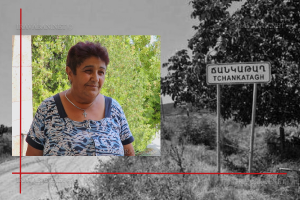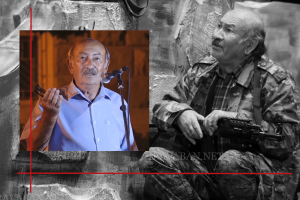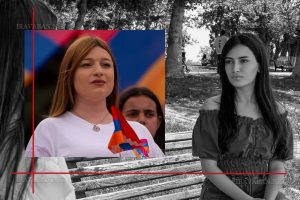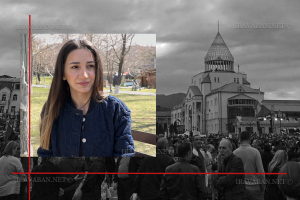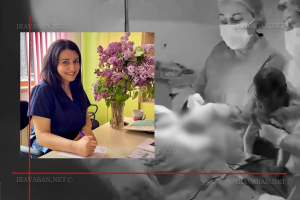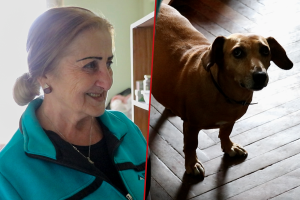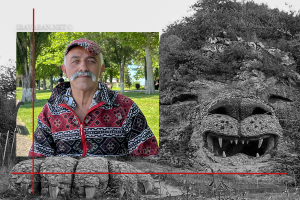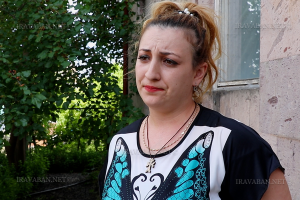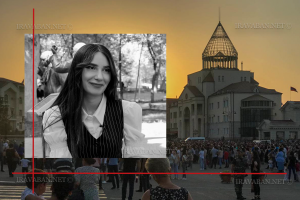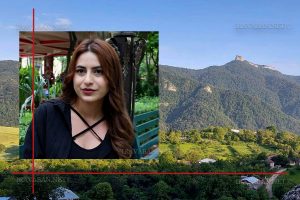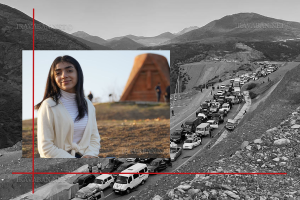Rommel Musaelyan is from Mushkapat village of Artsakh, but got married and lived in Mokhratagh village of Martakert region. On 19 September, when the attack of Azerbaijan was unleashed, she was at home.
“I did not expect this day. I am an optimistic person in general. Even on the 44th Day War, I was thinking that maybe it will end soon, it will end today, and it will end tomorrow. On the last day, hours before the ceasefire, my grandson was killed. And we learned two days that he died. He is in Yerablur. On the fortieth day I went to Yerablur and came back to the village Mokhratagh,” she told in the framework of “Artsakh: Armenian Genocide 2023. Stories of Survivors” documentary project of Iravaban.net.
She said she felt that every explosion was a sign of war. On 20 September, the next day, the shootings stopped more or less, when they were told that negotiations were going on between the representatives of Azerbaijan and the Russian peacekeepers.
“My neighbor came and said: we have to leave soon, the war will continue. I didn’t believe it, to tell the truth. I waited for a day; I had not prepared anything to take with me when leaving. Then we were told that they gave two days, one of the acquaintances said to prepare as soon as possible so that we can go out. He said that it is not necessary to take much. It was a small car; it had to transport four families. I took my grandson’s clothes, shoes and coat in a bag. On that day we lit fire in the ‘tonir’ and baked bread. I said, ‘we will give it to whoever does not have it on the way’. They already knew that I had bread, they came, and I distributed it too. And so until Kornidzor. “How many times have we seen this cruelty,” Rommel said.
According to her, what happened was Genocide, in a nine-month siege without bread and food.
“I was saying ‘Let no one lose each other’. I knew that they wouldn’t leave us in peace, and if we were to leave, it should have been at least in an organized way, so that they wouldn’t kill us on the way. I do not know how it was organized in other regions, but the Head of our region said that they would not move until the last person leaves. He waited until the last soldier left the post, and during that time, not a single Mokhratagh resident, not a single Martkert resident moved. I came out. But I wish that it was only my home that I lost. I have arranged a house two or three times. The first time when I returned to our home that was occupied by the Turks for nine months I found our photos on the steps. We arranged the house again. And we lost it again. But I would really wish not a single hair to fall from the heads of my Hrayr and Arthur.” Rommel said.
She told honestly that she went to Yerablur and did not know what she was feeling, whether she was happy that she came or not. They are conflicting emotions.
“What kind of integration are we talking about?” I know them well, I have worked with them, and I know their discrimination well. Back in 1967, when the situation was still peaceful, when our children were not humiliated in kindergartens, that he was an Armenian, two Armenians, the foreman and the worker, did not find the child, they searched for it, and found it slaughtered. The Turk had butchered him in a shameful manner in the vineyard. What integration after that? No, I worked with them. We lived in Baku for three years, my husband said that he can’t live there anymore, so we left and moved to the village,” Rommel said and added that no one will integrate.
She remembers how they left Artsakh, how the Azerbaijanis mocked and laughed on the way, and she covered her face with his hands so as not to see the Azerbaijani military.
“Artsakh: Armenian Genocide 2023. Stories of Survivors” documentary project of Iravaban.net is aimed at collecting the memories and testimonies of citizens forcibly displaced from Artsakh occupied by Azerbaijan, about the genocide of the Armenians of Artsakh committed by Azerbaijan, atrocities, the days of war, the path of deportation, etc.
Iravaban.net seeks help from citizens who will voluntarily agree to translate materials into different languages: Russian, English, French, Arabic, Persian, Turkish, Georgian, Chinese…
You can write to our e-mail address at: [email protected]
Details in the video.
Hasmik Sargsyan

